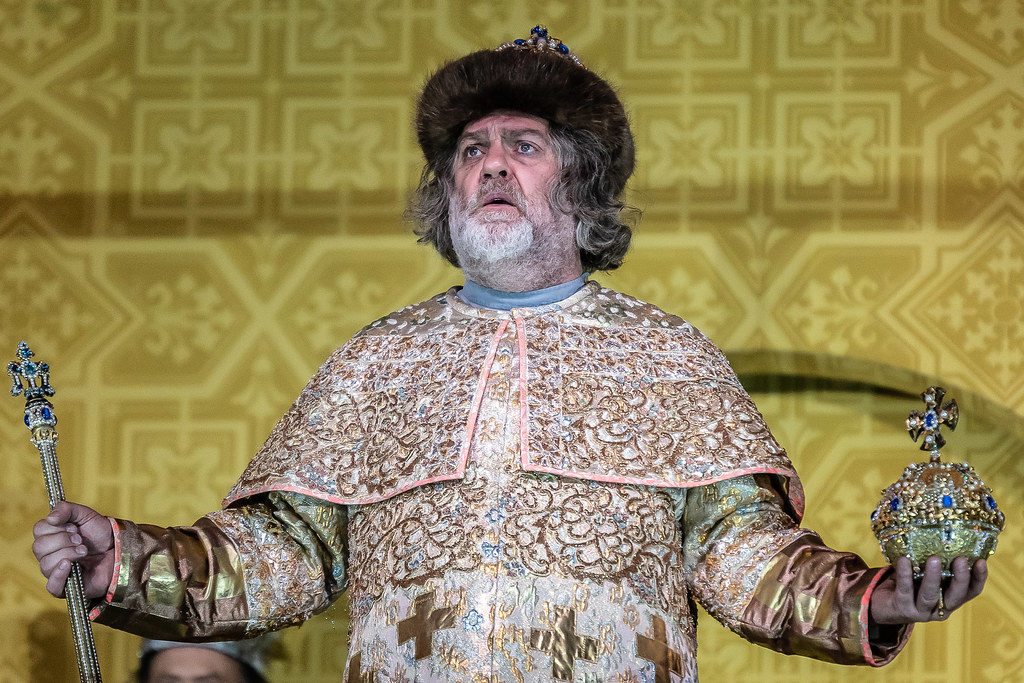
Bryn Terfel as Boris Godunov, ROH 2019, Photo Clive Barda
The Boyars, Back in Town
Boris Godunov, opera in seven scenes, original version (1869), music by Modest Musorgsky, libretto by Musorgsky adapted from the historical tragedy by Alexander Pushkin, Orchestra of the Royal Opera House conducted by Marc Albrecht, directed by Richard Jones, Royal Opera House, Wednesday 19th June 2019, reviewed by Leslie Jones
This first revival of Richard Jones’ 2016 production of Boris Godunov is a splendid visual spectacle, in terms of lighting, costumes and sets. The split level stage, designed by Miriam Buether, is used to telling effect. In the opening scene, Boris (Bryn Terfel), looking troubled, is sitting alone on the lower level. All seems sens dessus dessous. In the brilliantly lit, semi-circular, upper tier, a mini-drama is being enacted. Tsar Fyodor’s eight year old son Dmitry is playing with a spinning top. His throat is then cut by three murderers, allegedly at Boris’s behest. This scene, presumably a projection of Boris’s guilt, is repeatedly revisited, as his thoughts return obsessively to the deed, like a finger to a scab. As he observes, “Cruel conscience, how terrible is your punishment”.
Marina Frolova-Walker, Professor of Music History at the University of Cambridge, notes in a recent lecture at Gresham College how Musorgsky invented a national style of music, a profound expression of Russian melancholy and pessimism, as in the orchestral prelude. Russian orthodox motifs, notably church bells, were incorporated into this musical palate.
Professor Frolova-Walker considers Pushkin the “Russian Shakespeare” and there are numerous parallels between Shakespeare’s work and Pushkin’s tragic play. The Holy Fool, Yurodivy (Sam Furness), through self-abasement, has earned the right to speak truth to power, somewhat like his counterpart in King Lear. Like Macbeth, Boris sees the ghost(s) of his victims and like Richard III (another child killer), he is supposedly reluctant to accept the throne because more concerned with piety than power. He is persuaded to do so by the mob. The people, as depicted by both playwrights, are essentially fickle, irrational and disloyal. When famine visits Russia, they soon switch allegiance from Boris to ‘The False Dmitry’.
Both Shakespeare and Pushkin evidently appreciated the benefits of comic relief. For the inebriated porter in Macbeth read the drunken monks Varlaam (the versatile John Tomlinson) and Missail, in the farcical scene set in an inn near the Lithuanian border. There are echoes here of Henry IV, part I (see ‘A mighty Achievement’, David Nice, Official Programme).
Over the years, great singers have performed the role of Boris, notably Feodor Chaliapin, Boris Christoff and Yevgeny Nesterenko. These are hard acts to follow but bass-baritone Bryn Terfel looks and sounds the part.
In the HBO mini-series Chernobyl, apparatchik Boris Shcherbina (Stellan Skardgård) calls for three volunteers to enter the stricken reactor and carry out remedial work to save millions of lives. He invokes Russia’s history of suffering and self-sacrifice, for they face certain death. Was the Chernobyl disaster part of the “impenetrable darkness” to come, as predicted by the ‘Holy Fool’?
Dr Leslie Jones is Editor of QR










